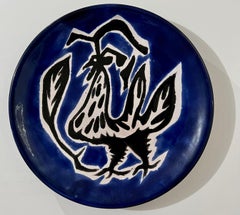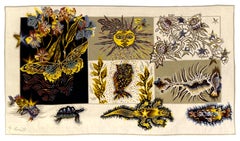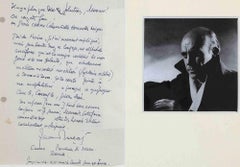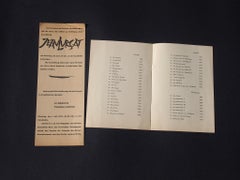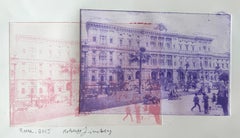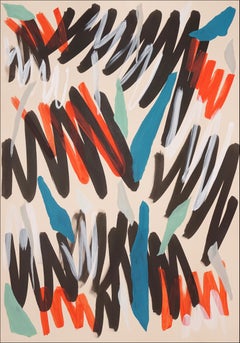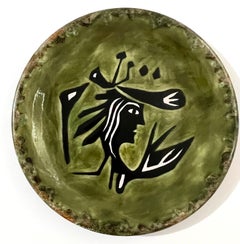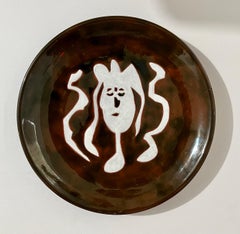Jean Lurcat More Art
Credited with helping revive the design and production of tapestries during the 20th century, French artist Jean Lurçat rubbed shoulders with some of the greatest painters in the world while weaving his own artistic narrative into the fabric of history.
Lurçat met artists Henri Matisse, Paul Cézanne and Pierre-Auguste Renoir in Paris in his early twenties — when the Bruyères native found himself fully immersed in the French art world. He had studied at Académie Colarossi and worked in the studio of sculptor Victor Prouvé, and later made paintings inspired by Fauvism. Lurçat first exhibited his tapestries in 1917.
Lurçat’s inaugural textiles were constructed with weaver Marthe Hennebert and were marked by Cubism and avant-garde–inspired art styles before he embarked on extensive travels that would enrich his work. Lurçat’s travels exposed him to other movements and styles that ranged from German Expressionism to Spanish and African influences that inspired his later works.
Lurçat’s tapestries found a regular home in 1925 at Jeanne Bucher’s gallery, which featured the work of other artists including Pablo Picasso, Hans Arp, Jacques Lipchitz, Georges Braque and Max Ernst. Between 1930 and 1936, Lurçat had solo exhibitions at the Flechtheim Gallery in Berlin and the Pierre Matisse Gallery in New York. In 1939 — when the popularity of tapestries had long been on the decline — Lurçat opened a factory with other artists in Aubusson, the home of a centuries-old tapestry production industry, in order to create modernist tapestries.
Over the course of his life, Lurçat designed more than 1,000 tapestries. One of his most notable, Apocalypse Tapestry (1948), is on display in the Church of Notre-Dame de Toute-Grâce and complements the original which dates back to the 14th century. His other highly acclaimed works include Song of the World (1957–64) and Four Seasons (1940).
While Lurçat’s best known works are his tapestries, he also produced engravings, book illustrations and ceramics. The Museum of Modern Art in New York City holds some of these book illustrations as well as a few other works in its permanent collection. Other works by Lurçat are held in the collections of the Detroit Museum of Fine Arts, the Musée Nationale d’Art Moderne, the Museum of Chicago, the Philadelphia Museum of Art and the National Gallery in Washington DC.
On 1stDibs, find a collection of Jean Lurçat wall decorations, decorative objects and ceramics.
Mid-20th Century Modern Jean Lurcat More Art
Ceramic, Glaze
20th Century Modern Jean Lurcat More Art
Tapestry, Wool
Mid-20th Century Contemporary Jean Lurcat More Art
Paper, Ink
1940s Jean Lurcat More Art
Paper, Ink
2010s Contemporary Jean Lurcat More Art
Printer's Ink, Archival Ink, Rag Paper, Monoprint, Other Medium, Monotype
2010s Neo-Expressionist Jean Lurcat More Art
Acrylic, Paper, India Ink
2010s Contemporary Jean Lurcat More Art
Printer's Ink, Archival Ink, Rag Paper, Monoprint, Other Medium
2010s Contemporary Jean Lurcat More Art
Printer's Ink, Archival Ink, Rag Paper, Monoprint, Other Medium, Ink
2010s Contemporary Jean Lurcat More Art
Ink, Rag Paper, Intaglio, Monotype
21st Century and Contemporary Modern Jean Lurcat More Art
Tapestry, Wool
2010s Contemporary Jean Lurcat More Art
Luster, Terracotta, Glaze
2010s Abstract Jean Lurcat More Art
Ink, Gouache, Rag Paper, Monotype
2010s Contemporary Jean Lurcat More Art
Paper, Ink, Mixed Media, Lithograph, Offset
20th Century Modern Jean Lurcat More Art
Tapestry, Wool
Mid-20th Century Abstract Jean Lurcat More Art
Fabric, Textile, Tapestry, Wool, Linen, Thread
Early 2000s Contemporary Jean Lurcat More Art
Paper, Ink
Mid-20th Century Modern Jean Lurcat More Art
Ceramic, Glaze
Mid-20th Century Modern Jean Lurcat More Art
Ceramic, Glaze
Mid-20th Century Modern Jean Lurcat More Art
Ceramic, Glaze
Mid-20th Century Modern Jean Lurcat More Art
Ceramic, Glaze
Mid-20th Century Modern Jean Lurcat More Art
Ceramic, Glaze
Mid-20th Century Modern Jean Lurcat More Art
Linen
1950s Surrealist Jean Lurcat More Art
Ceramic
